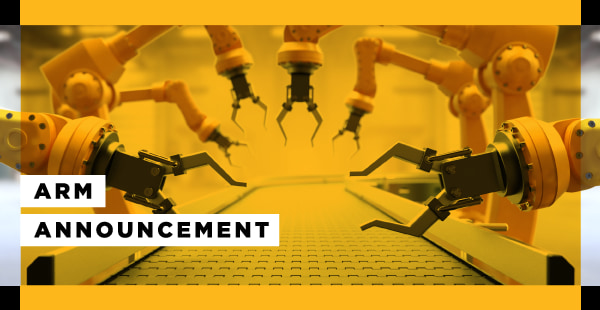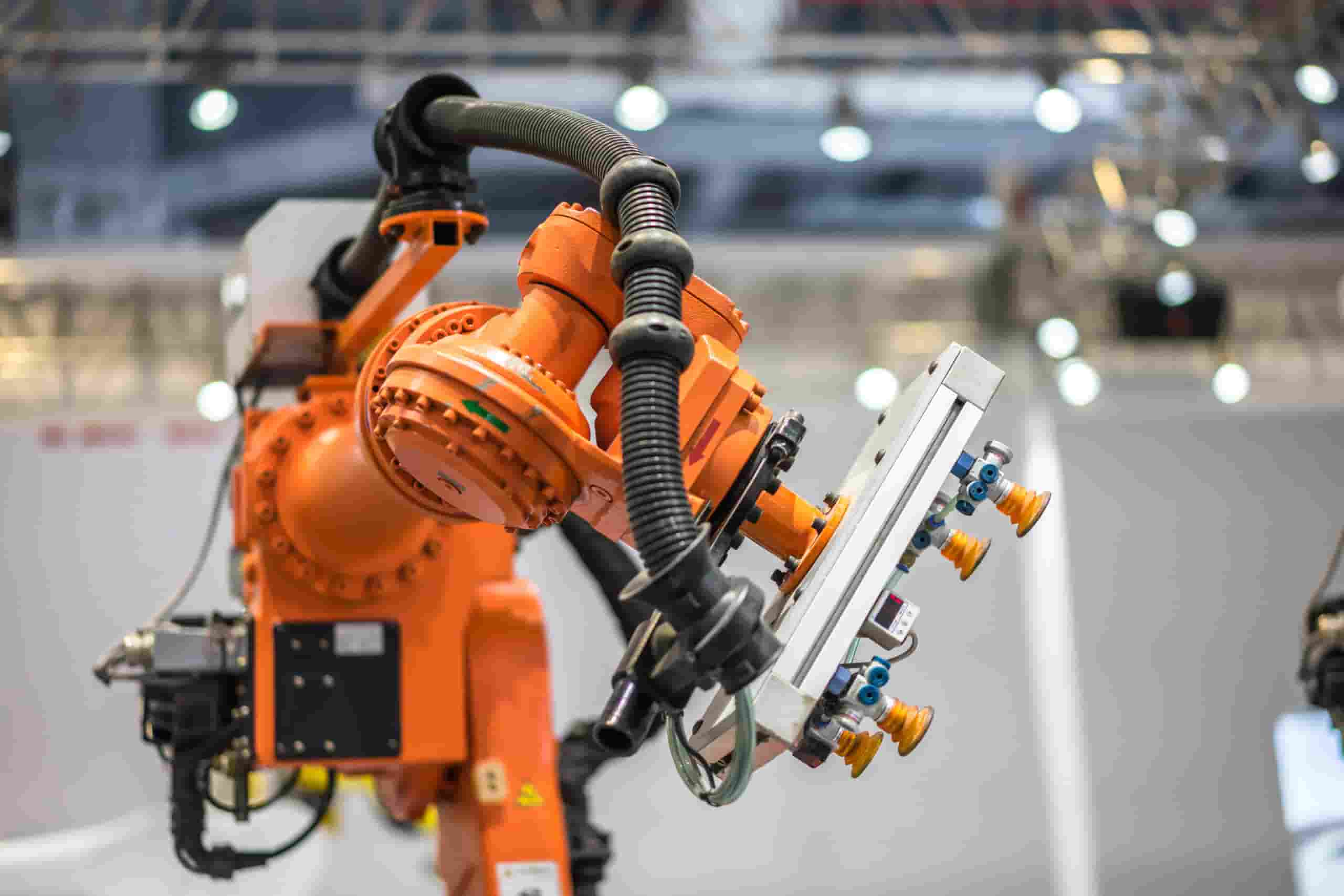
Contact:
Suzy Teele
Head of Marketing and Communications
Advanced Robotics for Manufacturing (ARM)
[email protected] O: 412-681-8264 C: 412-310-5207
Advanced Robotics for Manufacturing (ARM) Announces Selection of Fourteen Technology and Education/Workforce Projects from First Project Call
Pittsburgh, PA – July 9, 2018. Advanced Robotics for Manufacturing (ARM) is proud to announce the selection of 8 technology projects and 6 education/workforce development projects resulting from ARM’s first formal project call announced in October 2017. These 14 projects have been selected for funding and will kick-off in the coming months, pending final contract negotiations.
ARM is the leading catalyst of robotics innovation and expertise, accelerating growth in U.S.-based manufacturing and high value careers. Founded in January 2017 by Carnegie Mellon University, and now operating as a separate non-profit member collaborative, ARM is a Manufacturing USA Institute.
Pending negotiation, ARM expects to award approximately $5.4 million in funding across these 14 projects, with each contributing a similar amount as cost share, for a total $10.8 million investment. When the teams are finalized, it is anticipated that more than 30 member organizations spanning industry, academia, robotics providers and non-profits will participate in this project call.
“The ARM team thanks all of our members who dedicated time to submit proposals for our first formal project call. Each of the selected projects epitomizes the strength of multi-disciplinary teams working collaboratively to solve complex technology and workforce development challenges in U.S. manufacturing,” stated ARM CEO Byron Clayton.
ARM’s Fall 2017 Technology Project call featured seven topic areas identified as important to our member organizations: identifying and packing objects, unloading and unpacking objects, transport and delivery through a complex/crowded floor, inspection of non-standard materials, tracking and traceability of components, surface treatments, and manipulating compliant materials.
“The technologies generated through our selected projects will address critical gaps in industrial robotics, as well as create new opportunities for the American workforce,” said Howie Choset, ARM Chief Scientist. “We anticipate that the project outputs will improve product quality and processes, as well as worker safety and career satisfaction.”
TECHNOLOGY PROJECTS
Subject to the finalization of all contractual details and requirements, the 8 selected Technology Projects are briefly outlined below.
Vision-Based Cleaning of Complex Structures with a Lightweight Compliant Arm
Principal Investigator: National Robotics Engineering Center (Carnegie Mellon University)
Project Description: This project centers on the development of a robotic system for surface treatment in a confined space. Once fully developed, ARM members will be able to leverage the software modules to enhance existing robotic systems with advanced manipulation capabilities. The modularity of the delivered software will enable future derivatives such as standalone visual inspection, generic surface treatments, advanced surface treatment, 3D mapping in confined spaces, and more.
Collaborative Robotics to Foster Innovation in Seafood Handling (FISH)
Principal Investigator: Northeastern University
Project Description: The FISH project will advance a robotic system that can reliably grasp, place, flip, and maneuver seafood. The project centers on the development of perception and planning algorithms that will identify and characterize different types of seafood and grasp them in constrained, collaborative environments alongside human workers. Perception in this project is critical due both to the need for human collaboration in the environment and due to the unpredictability of the objects. The project plan is based around existing robotic arms, allowing for quick and low-cost adoption by large and small companies upon completion.
Robot-Assisted Wire Harness Installation
Principal Investigator: QinetiQ North America
Project Description: This project centers on empowering human workers and reducing risk of injury in manufacturing environments by developing a robot-assisted wire harness installation system. This system will augment human cognitive and physical abilities while eliminating errors and focusing on worker assist, rather than worker replacement. The project will engage a twin arm robot to hold, route, and position a wire harness while using eye-safe laser pointers to indicate correct wire to terminal and connector pair locations. In addition to the technology advancement, the project will also feature a workforce development aspect with the creation of a training course for the technology.
Mixed Multi–Angle Robotic IR Camera Control for Thermomechanical Surface Processes
Principal Investigator: Siemens Corporation
Project Description: Current surface processes for aerospace and defense are highly complex, frequently poor yield, and require long and expensive development and qualification processes, all of which contribute to high development, production and deployed system maintenance costs. The project team is working to develop a robotic system for monitoring thermomechanical surface processes of advanced composite materials. By combining in-situ sensing, simulation, and robot motion, the technology can be applied across many applications and industry.
Passive Object Tracking via Multi-Spectra Robotic Sensor Fusion Package and Semantic Segmentation
Principal Investigator: Siemens Corporation
Project Description: This project centers on component tracking and traceability across the entire production line using sensor fusion, computer vision, and robotic and deep learning-based technologies, improving accuracy and lowering cost. The approach is to build a sensor fusion package that will scan factory space and build an accurate image and 3D volumetric map of the space and surfaces in multi-spectra modalities. Additionally, the technology will be designed for flexible integration with existing PLM and factory automation systems, allowing for widespread seamless adoption.
Advanced Robotic Grinding System for Metal Parts
Principal Investigator: Texas A&M University
Project Description: Grinding metal parts remains a repetitive and ergonomically unfriendly task that often generates inconsistent results. This project will empower American workers to transition from manual grinders into safer robot-operated roles through the development of an advanced robotic grinding system. The system will use model-based control and learning algorithms to account for uncertainties in its environment while using automated trajectory generation and 3D part model and identification of surface regions, creating consistent, high-quality results.
Robotic Assistants for Composite Layup
Principal Investigator: University of Southern California
Project Description: Composite layup, despite being labor-intensive, remains a highly manual process and thus limited to low-volume runs or specialty composite item production. The robotic technologies generated through this project aim to make the layup process more collaborative with robot assistants working alongside humans. This will require advancements in perception, planning, and control areas. Additionally, the project will evaluate the quality of robotic layup processes and compare it to the manual process of today.
Automated Wire Harness Assembly
Principal Investigator: Wichita University
Project Description: Today’s wire harness assembly process is a time-intensive, manual process that results in inconsistent product quality and high prices. This project seeks to reduce wire harness assembly costs by using collaborative robots to lay wiring through the development of a unique end effecter. The technology will integrate into existing ECAD, increasing the ease of integration and allowing for adoption by other markets.
EDUCATION/WORKFORCE DEVELOPMENT PROJECTS
ARM’s first Education/Workforce Development Project Call focused on the creation of sustainable robotics apprenticeship programs that respond to specific needs of small and medium manufacturers (SMMs) in robotics and automation.
“We believe that the selected apprenticeship projects will actively address critical gaps in the manufacturing workforce,” notes Rebecca Hartley, ARM Chief Workforce Officer. “These programs will catalyze engaging, high-value careers in manufacturing while emphasizing the importance of lifelong, active learning for continued career success.”
Subject to the finalization of all contractual details and requirements, the 6 selected Education/Workforce Projects are briefly outlined below.
Teach-Bot Apprentice Education and Training System
Principal Investigator: Massachusetts Institute of Technology (MIT)
Project Description: This project lowers the barriers of entry to careers in manufacturing with no coding, technical jargon, or complex reasoning involved in the introductory course. The Teach-Bot project centers on the use of ABB robots to teach industrial robotics to pre-apprentices, American workers, and SMM managers. The robots play the role as an instructor and mentor by showing demos and executing experiments.
Revitalizing Apprenticeships for Small and Medium Sized Industries
Principal Investigator: Clemson University
Project Description: This project centers on the creation of modules to facilitate stackable credentials in robotics and automation that culminate in a Robotic Systems Certificate. In addition to student-focused modules, the project includes a careers pathway focus to educate students, counselors, and parents about careers in robotics-enabled industries.
SMART – Smart Manufacturing and Advanced Robotics Training
Principal Investigator: The Robotics Academy (Carnegie Mellon University)
Project Description: The SMART Project centers on the creation of stackable credentials to provide students with robotic preparation skills. By integrating input from community colleges, manufacturers, and roboticists, SMART will help high school students gain fundamental robotics training for future careers in robotics. This program will first target students in high school, but in the future will expand to target unemployed, underemployed, and incumbent workers
Robotics Technician Apprenticeship Program
Principal Investigator: Catalyst Connection
Project Description: The Robotics Technician Apprenticeship Program is an expansive project that will enhance existing training resources, provide in-class training, offer lab/experiential, and secure industry-led training for participants at manufacturing job sites.
Apprenticeship Academy Mechatronics Pilot Program with NIMS Recognized Robotics Certification
Principal Investigator: The Commonwealth Center for Advanced Manufacturing (CCAM)
Project Description: This project will create an robotics apprenticeship that focuses on Mechatronics as the foundation to create a NIMS-recognized Robotics Certification. Specifically, this program will address the manufacturing talent gap for transitioning military, under/unemployed, and youth to fill 3.5 million manufacturing jobs needed in the next ten years. The project is structured as a learn-as-you-earn career path with a participating industry employer who sponsors the student’s training and pays their salary. The stackable credentials will leverage the CCAM Apprentice Academy Pilot Program in Mechatronics with all curricula and training will being vetted by industry and stakeholder involvement.
Connecticut Apprenticeship Program in Robotics and Automation (CAPRA)
Principal Investigator: University of Connecticut
Project Description: This project establishes a network of Connecticut manufacturers focused on robotics and automation with the following outcomes: 1) the launching of the first year of a modular dual-training apprenticeship program; 2) the implementation of a faculty in-residence program for technology development and insertion and; 3) long-term strategic planning to ensure program growth and sustainability.
About ARM
ARM (Advanced Robotics for Manufacturing), a Manufacturing USA® institute, accelerates the advancement of transformative robotic technologies and education to grow U.S. global manufacturing competitiveness. Founded in January 2017 by Carnegie Mellon University, ARM operates as a separate non-profit member collaborative. Learn more at www.arminstitute.org. Follow us on Twitter at @ARM_Robotics.
